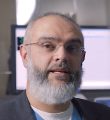- Home
- Advanced Approaches to Combined Epicardial and Endocardial Strategies – From New Consensus to Practice
Advanced Approaches to Combined Epicardial and Endocardial Strategies – From New Consensus to Practice
- Heart Rhythm
Available Credit:
- 1.00
Course Published On:
Course Expiry Date:

Overview
In this session, filmed at EHRA 2024 in Berlin, DE moderators Dr Hugh Calkins (Baltimore, US) and Prof Riyaz Kaba (London, UK) lead an international faculty comprising Prof Carlo de Asmundis (Brussels, BE), Dr Manuela Cireddu (Milan, IT) and Prof Claudio Tondo (Milan, IT) to discuss the endocardial approach to management of arrhythmias.
The faculty consider which patients may benefit from the hybrid approach (particularly in light of PFA), and review what the guidelines do and don’t say about hybrid ablation.
Support Statement
This programme is supported by an unrestricted educational grant from AtriCure, Inc.
Disclosure
In compliance with EBAC guidelines, all speakers/chairpersons participating in this programme have disclosed or indicated potential conflicts of interest which might cause a bias in the presentations. The Organising Committee/Course Director is responsible for ensuring that all potential conflicts of interest relevant to the event are declared to the audience prior to the CME activities.
Terms & Conditions
Radcliffe Education requires contributors to our CME programmes to disclose any relevant financial relationships that have occurred within the past 12 months that could create a conflict of interest. These will be identified in the faculty section if applicable.
The session, ‘Advanced Approaches to Combined Epicardial and Endocardial Strategies – From New Consensus to Practice’ is accredited by the European Board for Accreditation of Continuing Education for Health Professionals (EBAC) for 1 hour of external CME credits.
Each participant should claim only those hours of credit that have actually been spent in the educational activity. EBAC works according to the quality standards of the European Accreditation Council for Continuing Medical Education (EACCME), which is an institution of the European Union of Medical Specialists (UEMS).
Through an agreement between the European Board for Accreditation of Continuing Education for Health Professionals and the American Medical Association, physicians may convert EBAC External CME credits to AMA PRA Category 1 Credits™. Information on the process to convert EBAC credit to AMA credit can be found on the AMA website.
Instruction to Participants
There is no fee for taking part in this online learning activity.
Activities are designed to be completed within 60 minutes and must be completed by the registered user. Physicians should only claim credits for time spent on the activity. To successfully earn credit, participants must complete the activity in full in the indicated time frame.
To complete the course and claim certification participants must:
- Read the course outline information supplied and complete pre-test questions if supplied prior to starting the activity. Users must read and study the activity in its entirety before completing the post-test questions.
- Your results will be automatically saved and if a pass score is achieved (where applicable), you may be eligible to claim credit for the activity and receive a certificate of completion.
Target Audience
- Electrophysiologists
- Cardiac surgeons
- Cardiologists
- Healthcare professionals
Learning Objectives
Upon completion of this activity, participants will be able to:
- Identify patient populations who may benefit from hybrid ablation
- Summarise the existing rationale and evidence for hybrid ablation beyond atrial fibrillation
- Understand how to integrate left atrial appendage exclusion in atrial ablation approaches
- Examine key aspects of new consensus recommendations for hybrid ablation
Module |
Title |
Duration |
Speakers |
|---|---|---|---|
| Session 1 | Introduction | 4 mins | Hugh Calkins (Baltimore, US) |
| Session 2 | The hybrid approach to the management of arrhythmias – Which patients may benefit? | 9 mins | Carlo de Asmundis (Brussels, BE) |
| Session 3 | Has PFA changed the approach to patient selection for hybrid ablation? | 10 mins | Manuela Cireddu (Milan, IT) |
| Session 4 | Review of atrial fibrillation guidelines – What they do and don’t say about hybrid ablation | 12 mins | Claudio Tondo (Milan, IT) |
| Session 5 | Discussion – Current and future roles of hybrid ablation | 9 mins | Hugh Calkins Riyaz Kaba Carlo de Asmundis Claudio Tondo Manuela Cireddu |
The hybrid approach to the management of arrhythmias – Which patients may benefit?
Duration: 9 mins
Speakers: Carlo de Asmundis (Brussels, BE)
Has PFA changed the approach to patient selection for hybrid ablation?
Duration: 10 mins
Speakers: Manuela Cireddu (Milan, IT)
Review of atrial fibrillation guidelines – What they do and don’t say about hybrid ablation
Duration: 12 mins
Speakers: Claudio Tondo (Milan, IT)
Discussion – Current and future roles of hybrid ablation
Duration: 9 mins
Speakers: Hugh Calkins Riyaz Kaba Carlo de Asmundis Claudio Tondo Manuela Cireddu
Chair
Speaker






